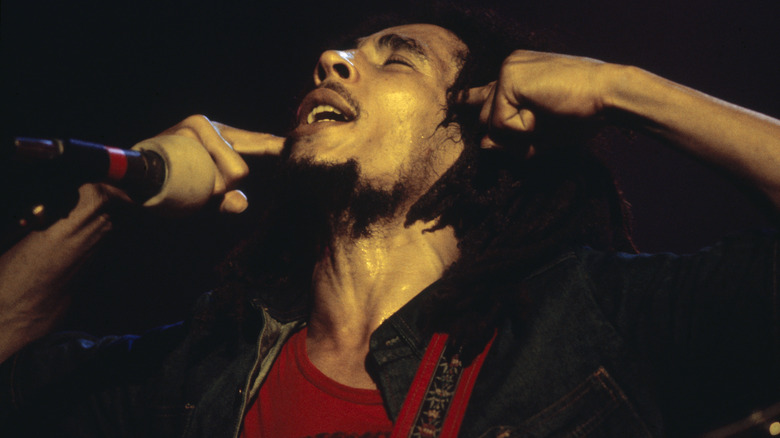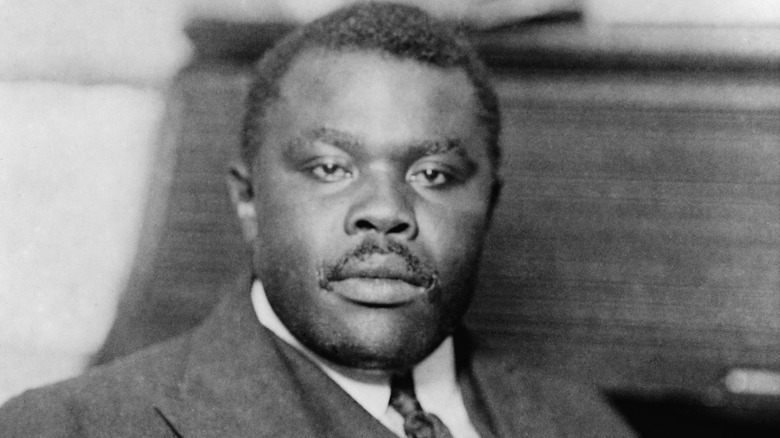What Was The Last Song Bob Marley Released Before He Died?
Bob Marley knew he was sick. The diagnosis — acral lentiginous melanoma — had been with him since 1977. It's a rare form of cancer, and the doctor who first found something suspicious under Marley's big toenail thought it was a soccer injury. When it was confirmed to be cancer, Marley refused to undergo the recommended amputation and opted for a less drastic operation.
But acral melanoma is aggressive as well as rare. Though Marley continued to write, tour, and travel, reaching the height of his career by 1980, he learned that year — after collapsing in Central Park — that his cancer had spread throughout his body into his lungs, liver, and brain. Per The Tribune, the neurologist who examined him in New York gave him a month to live. Marley outlasted that prediction, but unconventional treatment in Germany did nothing to arrest the cancer. He knew before the end came that he was terminal.
Whether he knew or suspected the end was coming while he worked on what would be his final album, "Uprising," we'll never know. The last song on that album, "Redemption Song," was written in 1979, several months before his collapse. But Marley's wife Rita has said (via uDiscover Music) that the singer was in a great deal of pain and had mortality on the brain while writing in his final years. And many have heard an expression of farewell in the music and lyrics of "Redemption Song."
Redemption Song was a musical departure for Marley
Bob Marley is most famous as a reggae musician and has been credited with introducing the genre to the world beyond Jamaica. So the fact that "Redemption Song" is, at least on the surface, such a different sound has caught many people by surprise. The song is an acoustic track, just Marley and his guitar. There are no electronics and none of the beats associated with reggae.
But "Redemption Song" isn't as big of a departure as it appears at first glance. Marley got his start on the acoustic guitar, after all. It was one of the only affordable instruments for poor Jamaicans of his generation, and he did his composing on guitar. His generation of singers was also heavily influenced by Bob Dylan and the folk movement of the 1960s, an influence that showed itself in earlier work by Marley and the Wailers.
The version of "Redemption Song" that made it onto "Uprising" isn't the one Marley first conceived, however. Per uDiscover Music, The Wailers went through at least 15 iterations of the song while recording, and they weren't all acoustic showcases. One version, released in the years since (above), is immediately recognizable as reggae. Ian McCann of uDiscover Music felt that it approached ska with its upbeat, bouncing quality. This brighter version — or any other utilizing the full band — might have made the album if not for Chris Blackwell, co-founder of Island Records. He convinced Marley that the acoustic version packed more punch.
The song was inspired by a political activist
Listeners — and his wife — have found in "Redemption Song" a statement of Bob Marley's mortality and legacy. He did say that he loved the song's meaning and wanted to write more in that vein. But if death was on Marley's mind while he worked on the song, he didn't mention so publicly. Nor did he mention his writing struggles. Per John Masouri's "Wailing Blues: The Story of Bob Marley's Wailers," bandmate Wya Lindo made uncredited contributions to the music.
The substance of "Redemption Song" covers many bases. The song opens with a story of enslavement and moves on to encouraging words of freedom. Elements of Marley's Rastafari beliefs are present, as is a message about atomic energy. At the time, South Africa was suspected of conducting a nuclear test (per Politico, it may been a joint venture with Israel), but as Marley explained the lyric, it was less a direct response to that act than it was a reassurance that even nuclear weapons can't erase time or mankind's hopes. He also borrowed from Pan-African activist Marcus Garvey. Garvey was an influence on Rastafarianism and a Jamaican nationalist. The line "Emancipate yourselves from mental slavery / None but ourselves can free our mind" was paraphrased from one of Garvey's speeches.
But the idea of "Redemption Song" being Marley's swan song has endured. Not only was it the last song he wrote and the last song listed on his last album, but it was the last song he ever performed — it closed his set at Pittsburgh in September 1980, just months before his death.

